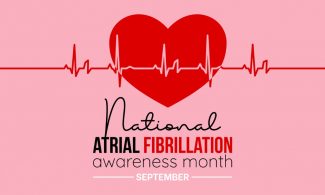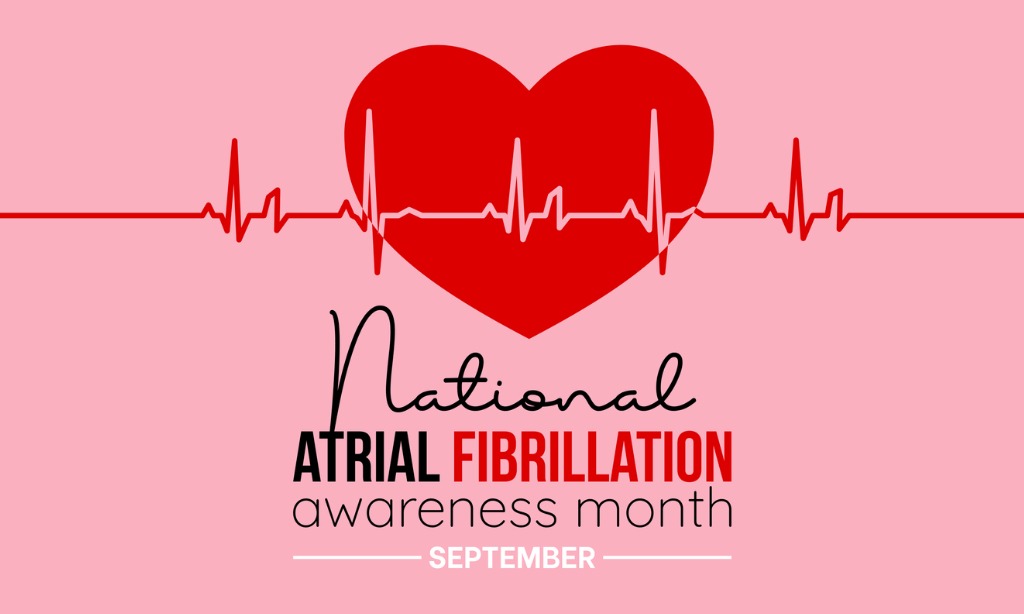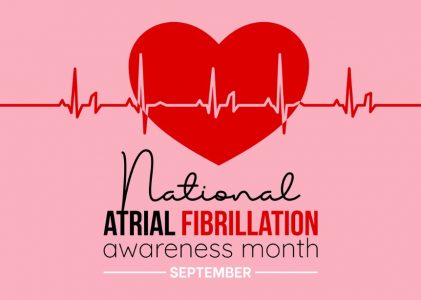 September is Atrial Fibrillation Awareness Month to draw attention to atrial fibrillation symptoms and help patients become more proactive to get an earlier diagnosis. Staying vigilant about your health is a great way to stay ahead of any issues and catch the problem faster, which can save lives. It is estimated by the CDC that 12 million Americans will have AFib by the year 2030.
September is Atrial Fibrillation Awareness Month to draw attention to atrial fibrillation symptoms and help patients become more proactive to get an earlier diagnosis. Staying vigilant about your health is a great way to stay ahead of any issues and catch the problem faster, which can save lives. It is estimated by the CDC that 12 million Americans will have AFib by the year 2030.
What is AFib?
Atrial fibrillation (AFib) is a term used for the most common type of treated irregular heartbeat or arrhythmia. AFib causes dizziness, heart palpitations, and shortness of breath in patients. AFib is a debilitating condition that can lead to more serious conditions such as heart failure and stroke. Not only does AFib take an emotional and physical toll on the patient, but it can also have a devastating financial impact.
While the exact causes of AFib remain unclear, it is understood that AFib may be genetic and oftentimes runs in families.
What are the Risk Factors of AFib?
Many health conditions can increase your risk of developing AFib, such as:
- Existing heart disease
- Patients with coronary heart disease or valve disease
- Patients who have suffered a heart attack
- Congestive heart failure
- Patients who have undergone recent heart surgery
- Patients with clogged arteries
- Diabetes
- Thyroid issues
- High blood pressure
- Emphysema
- Chronic lung disease
- Patients with asthma
Additionally, AFib is often seen in patients who are overweight or have sleep apnea. Historically, AFib usually started showing in middle-aged patients, but now it is beginning to show in much younger patients as well.
What Symptoms Should I Watch For?
It is known that stress causes all kinds of health issues if we are not careful. AFib is no different. Stress seems to be an underlying cause of triggering AFib in patients, so it is important to take care of yourself and contact your physician if you are not feeling well.
Atrial fibrillation must be diagnosed and treated as soon as possible, otherwise, there can be life-threatening consequences. Patients with AFib often feel scared and suffer from anxiety, which is understandable when feeling heart palpitations. It is important to pay attention to your body and look for the following symptoms:
- Heart palpitations
- Feeling of a skipped heartbeat
- Sweating
- Chest pain
- Erratic heartbeat
- Feeling dizzy, weak, breathless, or tired
Patients with atrial fibrillation describe feeling exhausted, tired, and weak after an episode. If you are experiencing any of these symptoms, contact your physician right away. Some patients who suffer from continual atrial fibrillation do not notice these symptoms but just have an overall sense of being tired or not feeling like themselves. Talk with your doctor about any changes that you notice in your overall health and discuss what testing should be done for a correct diagnosis, such as a cardiac MRI.
Receiving a Diagnosis of Atrial Fibrillation
The standard procedure is to diagnose AFib by having an EKG or ECG (electrocardiogram) performed. Electrodes are put on your skin and record your heart’s electrical activity. This procedure is not intrusive and only takes a few minutes to perform.
During an EKG procedure, you must be having an AFib episode during the testing for it to be recorded on the test. In cases where the irregular heartbeat cannot be captured during testing, patients can wear an event monitor that can be activated during an episode for recording and diagnostic purposes.
Atrial Fibrillation Categories
When you receive a diagnosis of atrial fibrillation, it will fall under one of the following categories:
- Longstanding persistent – AFib lasting longer than one year and is continuous
- Paroxysmal – episodes lasting less than seven days and are intermittent
- Permanent – continuous AFib where you or your doctor decide not to restore normal heart rhythm (this is becoming rarer)
- Persistent – AFib lasting longer than seven days and in continuous
It is important to note that patients can start in one category of AFib and progress into a different category over time. It is crucial to continue to attend all healthcare appointments and inform your healthcare provider of any changes in your condition.
Treatment for AFib
Atrial fibrillation is progressive and may start out being treatable with medication, but episodes may become more frequent, and medication may be less effective over time. Patients with atrial fibrillation also run the risk of stroke and heart failure. These are very serious conditions that require the attention of medical professionals.
Physicians typically use either medications or surgery for the treatment of atrial fibrillation. Medications are used to control your heart rate, but once you are in heart failure, some medications may not be able to reverse it. Catheter ablation and surgery have been successful in dramatically improving or reversing heart failure and AFib in patients. You can find support and many additional resources for patients and caregivers at StopAFib.org.
Cardiac MRI Imaging Services
Greater Waterbury Imaging Center, GWIC, provides patients with comprehensive, non-invasive cardiac MRI to assist in detecting heart abnormalities. Benefits of cardiac MRI range from being able to acquire high-quality images of the heart without exposure to ionizing radiation to the ability to accurately diagnose many cardiovascular conditions and monitor the progression of certain heart disorders. GWIC provides a dedicated, knowledgeable, and caring staff that can assist you with all your MRI needs, from cardiac MRI to general MRI.
GWIC cares about your health and overall wellness and is committed to providing the most professional and compassionate MRI experience possible. We urge you to speak with your physician if you experience any symptoms of AFib to receive early diagnosis and treatment. Contact us to learn more about our many MRI services and how we can best serve your diagnostic imaging needs.


